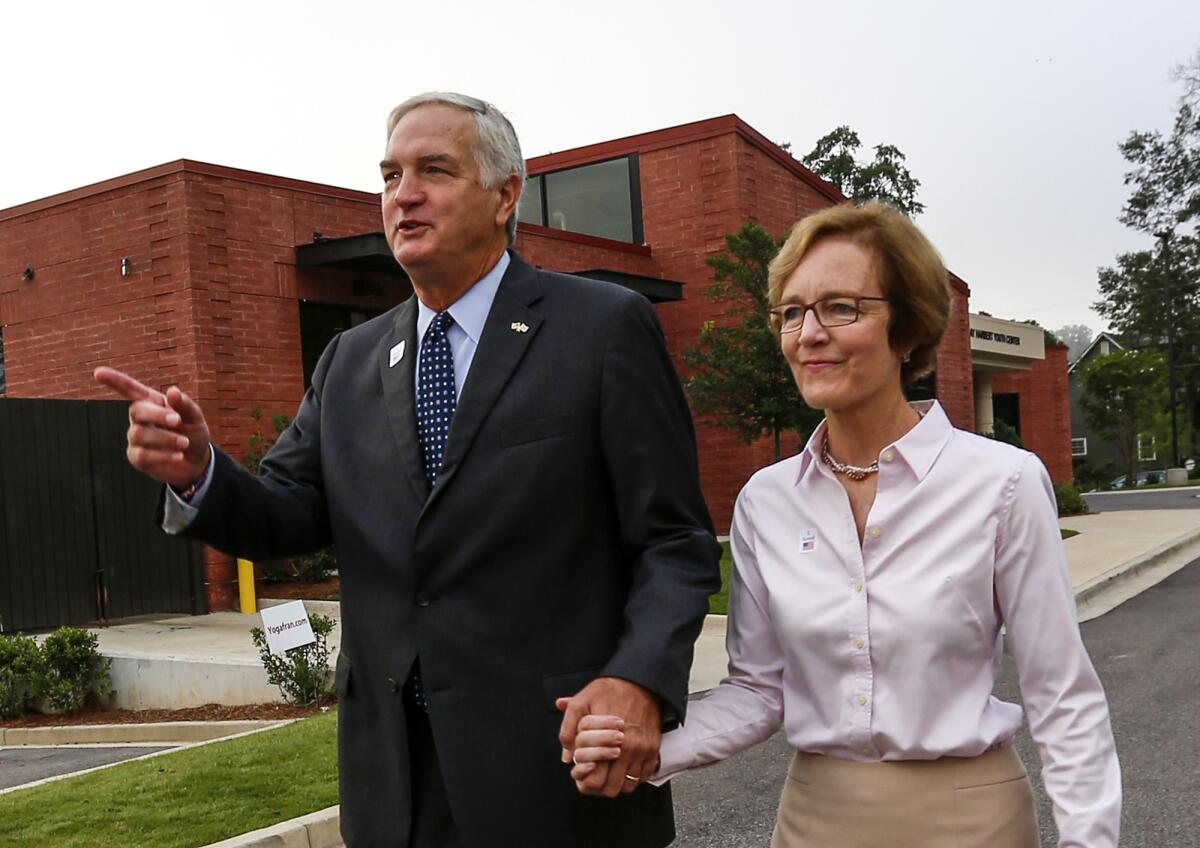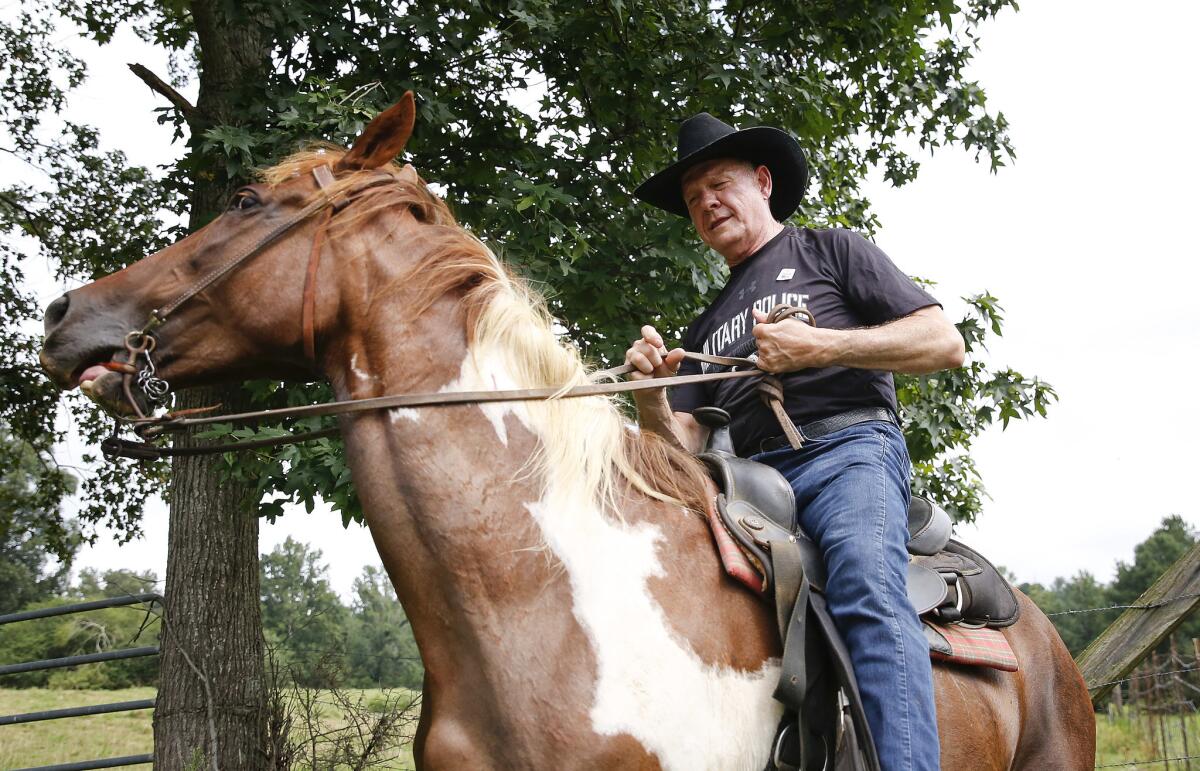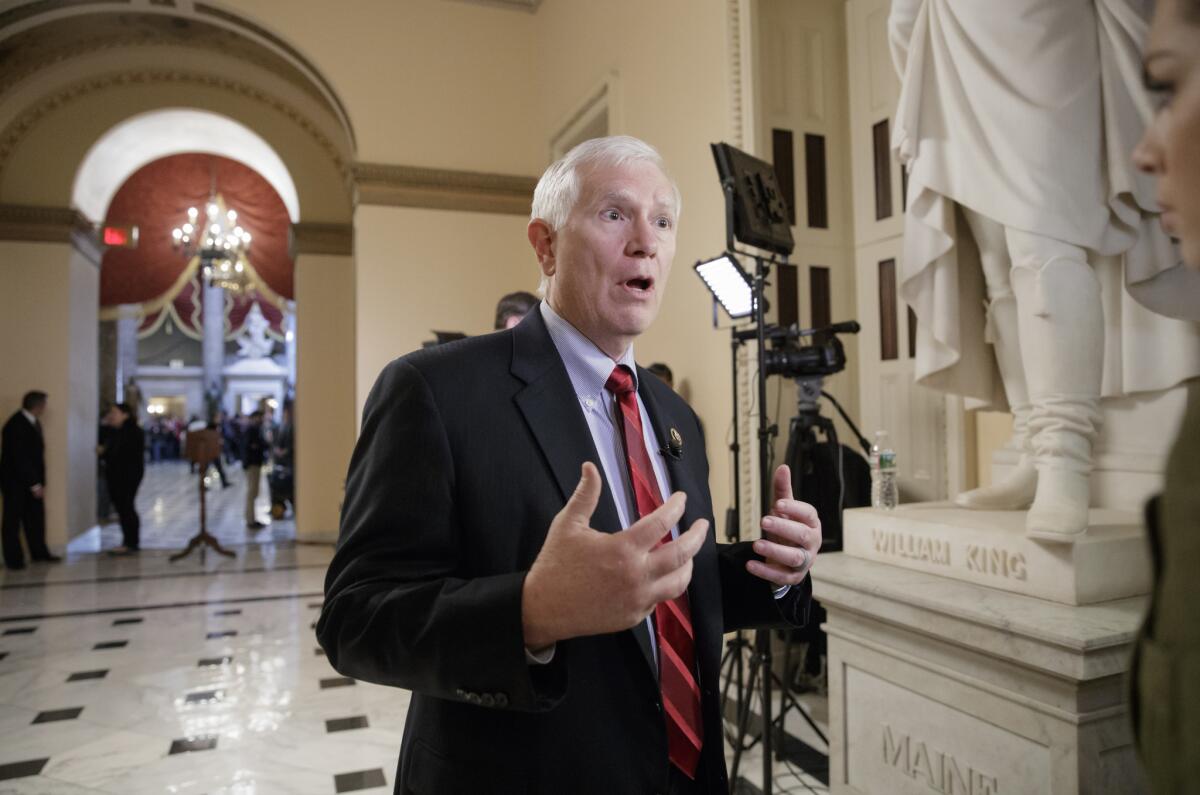With help from Trump, Alabama senator heads to runoff in a race that has divided the GOP

- Share via
Reporting from Washington — With a strong push from President Trump, Alabama Sen. Luther Strange secured a runoff spot late Tuesday in the Republican primary for his seat.
The senator now faces top vote-getter Roy Moore, the outspoken former chief justice of the Alabama Supreme Court. Moore’s horseback ride to the polls Tuesday demonstrated the political showmanship that has made him a favorite among Alabama voters.
With about four-fifths of precincts reporting results late Tuesday, Moore had 43% of the vote, compared with 31% for Strange. With no candidate achieving the 50% needed to secure the nomination, the Republican runoff is set for Sept. 26.
The race exposed the potential reach as well as the limits of Trump’s influence, even in a state where the president remains hugely popular.
Voters consistently preferred Moore, despite a strong White House endorsement for Strange, who took over the seat this year when Jeff Sessions, the state’s longtime senator, resigned to become U.S. attorney general.
But Trump’s support appears to have at least enabled Strange to avoid the embarrassment of not securing the second spot.
“We’re on to the runoff,” Moore tweeted as the Associated Press called the race about two hours after polls closed. “Time for conservatives across Alabama to unite and deliver a knockout punch to the establishment!”

Trump’s investment in the race was never a sure bet in the primary. And it may not be one that can be easily replicated in other contested Republican primaries in Nevada and Arizona, where the president is far less popular.
“It’s a weird race,” said Brent Buchanan, a consultant in Alabama who is unaffiliated with any of the candidates. “I don’t think you take this and say this is an omen for the 2018 primaries. There’s just too many anomalies to make assumptions off what happens.”
Trump may be more helpful in upcoming primary races by steering clear of the states where his popularity has tumbled and the Republican incumbents are charting their own paths, often with their own brands.
In Nevada, Sen. Dean Heller, who faces a pro-Trump challenger, recently acknowledged that he voted for Trump last fall, a disclosure that may shore up his base of Republican support but could drive off more centrist Republicans and independents in the Silver State.
In Arizona, ads are now promoting Sen. Jeff Flake, one of Trump’s most outspoken Republican critics, as principled in a nod to opposition to the president, despite a challenge from a Trump-aligned candidate.
Other primary races among Republicans hoping to take on Democratic incumbents in Indiana and West Virginia are emerging with splits over Trump support.
But in Alabama, strategists were relying on the president’s high-profile tweets to boost Strange’s sagging campaign by turning out voters who may not have been paying close attention to an otherwise sleepy August special primary election.
Trump repeatedly tweeted his support for Strange as polls opened Tuesday morning, as did Vice President Mike Pence. The Senate Leadership Fund, a group aligned with Senate Majority Leader Mitch McConnell (R-Ky.), poured $4 million into the race.
Strange highlighted his ties to the president.
“We’ve developed a personal friendship. We like each other,” he said on “Fox & Friends.”
“I’ve done everything you could possibly do to support the president’s agenda, and believe me that’s what the people of Alabama want to see done.”
But the senator continued to face skepticism from voters that may follow him to the runoff.
On the job just a few months, “Big Luther,” as the towering senator is known, was scrutinized over his backing from McConnell, who is unpopular among many Trump voters, and his appointment by the former governor, who resigned amid an ethics investigation Strange had spearheaded as Alabama’s attorney general.
In Moore, voters had a known favorite who in many ways had captured Trump’s appeal to state voters.

Moore has twice been sidelined from the bench, forced to resign as chief justice of the state Supreme Court for refusing to take down a Ten Commandments display, and later, after being reinstated by voters, suspended for failing to comply with the U.S. Supreme Court’s upholding of same-sex marriage.
Trailing in the nine-candidate field was Rep. Mo Brooks, who was backed by Sean Hannity, the Fox News host, and other conservatives as the hard-driving House Freedom Caucus member whose early criticisms of Trump strategists say cost him among voters.
On the Democratic side, Doug Jones cleared a crowded field to become the nominee.
Alabama remains a Republican stronghold, but Democrats are monitoring the race for the possibility of inroads for the general election in December.
ALSO
Trump wants a border wall, but few in Congress want to pay for it
With a push from Trump, House Republicans pass Obamacare overhaul
More coverage of politics and the White House
More to Read
Get the L.A. Times Politics newsletter
Deeply reported insights into legislation, politics and policy from Sacramento, Washington and beyond. In your inbox twice per week.
You may occasionally receive promotional content from the Los Angeles Times.











